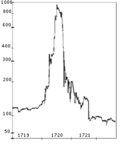Taras Shevchenko
The Business and Economics Portal  Business is the practice of making one's living or making money by producing or buying and selling products (such as goods and services). It is also "any activity or enterprise entered into for profit." A business entity is not necessarily separate from the owner and the creditors can hold the owner liable for debts the business has acquired except for limited liability company. The taxation system for businesses is different from that of the corporates. A business structure does not allow for corporate tax rates. The proprietor is personally taxed on all income from the business. A distinction is made in law and public offices between the term business and a company (such as a corporation or cooperative). Colloquially, the terms are used interchangeably. (Full article...) Economics (/ˌɛkəˈnɒmɪks, ˌiːkə-/) is a behavioral science that studies the production, distribution, and consumption of goods and services. Economics focuses on the behaviour and interactions of economic agents and how economies work. Microeconomics analyses what is viewed as basic elements within economies, including individual agents and markets, their interactions, and the outcomes of interactions. Individual agents may include, for example, households, firms, buyers, and sellers. Macroeconomics analyses economies as systems where production, distribution, consumption, savings, and investment expenditure interact; and the factors of production affecting them, such as: labour, capital, land, and enterprise, inflation, economic growth, and public policies that impact these elements. It also seeks to analyse and describe the global economy. (Full article...) Selected articleBAE Systems plc is a British multinational defence, security and aerospace company headquartered in London in the United Kingdom and with operations worldwide. It is among the world's largest defence contractors; it ranked as the second-largest based on applicable 2012 revenues. Its largest operations are in the United Kingdom and United States, where its BAE Systems Inc. subsidiary is one of the six largest suppliers to the US Department of Defense. Other major markets include Australia, India and Saudi Arabia. The company was formed on 30 November 1999 by the £7.7 billion merger of two British companies; Marconi Electronic Systems (MES) – the defense electronics and naval shipbuilding subsidiary of the General Electric Company plc (GEC) – and British Aerospace (BAe) – an aircraft, munitions and naval systems manufacturer. Selected image
Selected economy The economy of the European Union is the joint economy of the member states of the European Union (EU). It is the second largest economy in the world in nominal terms, after the United States, and the third largest at purchasing power parity (PPP), after China and the US. The European Union's GDP is estimated to be $19.99 trillion (nominal) in 2025 or $29.18 trillion (PPP), representing around one-sixth of the global economy. Germany, France and Italy are the three largest economies in the European Union, accounting for approximately 52.6% of the EU's total GDP. Germany contributes 24.3%, while France accounts for 16.2% and Italy for 12.1%. In 2023, the social welfare expenditure of the European Union (EU) as a whole was 26.8% of its GDP. The EU has total banking assets of more than $38 trillion, France accounts for 26% ($10 trillion) of Europe's total banking assets followed by Germany with 18% ($7 trillion) and Italy with 8% ($3 trillion). Global assets under management in the EU is more than $12 trillion, with France accounting for more than 33% ($4 trillion) of Europe's total AUM followed by Germany with 16% ($2 trillion) and Italy with 12% ($1 trillion). Paris is by far the economically strongest city in the EU, with a GDP exceeding $1 trillion. Paris is a major economic hub in the EU, with Euronext Paris, the largest stock exchange in the EU by market cap. Frankfurt, Germany's financial center, is the second-largest in the EU, hosting the Frankfurt Stock Exchange, although it is significantly smaller than Paris in terms of market cap and economic influence. (Full article...) Selected quote"In all countries, however, men seem at last to have been determined by irresistible reasons to give the preference, for this employment, to metals above every other commodity. Metals can not only be kept with as little loss as any other commodity, scarce any thing being less perishable than they are, but they can likewise, without any loss, be divided into any number of parts, as by fusion those parts can easily be reunited again; a quality which no other equally durable commodities possess, and which more than any other quality renders them fit to be the instruments of commerce and circulation. The man who wanted to buy salt, for example, and had nothing but cattle to give in exchange for it, must have been obliged to buy salt to the value of a whole ox, or a whole sheep, at a time. He could seldom buy less than this, because what he was to give for it could seldom be divided without loss; and if he had a mind to buy more, he must, for the same reasons, have been obliged to buy double or triple the quantity, the value, to wit, of two or three oxen, or of two or three sheep. If, on the contrary, instead of sheep or oxen, he had metals to give in exchange for it, he could easily proportion the quantity of the metal to the precise quantity of the commodity which he had immediate occasion for."
TopicsRelated WikiProjectsDid you know (auto-generated) -
On this day in business history
General imagesThe following are images from various business-related articles on Wikipedia.
More did you know
Business news
SubcategoriesRelated portals
Things you can doUrgent and important articles are bold
WikimediaThe following Wikimedia Foundation sister projects provide more on this subject:
SourcesDiscover Wikipedia using portals |

 Read
Read
 AUTHORPÆDIA is hosted by Authorpædia Foundation, Inc. a U.S. non-profit organization.
AUTHORPÆDIA is hosted by Authorpædia Foundation, Inc. a U.S. non-profit organization.







































